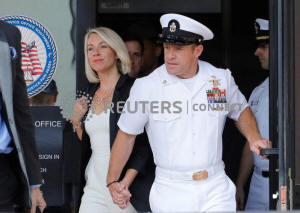|
Military jury weighs sentence for U.S.
Navy SEAL for posing with dead prisoner
 Send a link to a friend
Send a link to a friend
 [July 03, 2019]
By Martry Graham [July 03, 2019]
By Martry Graham
SAN DIEGO (Reuters) - A military jury was
set to decide on Wednesday whether to punish a U.S. Navy SEAL platoon
leader who was acquitted of murdering a captured Islamic State fighter
but convicted of unlawfully posing for pictures with the detainee's dead
body.
The seven-member jury found Special Operations Chief Edward Gallagher,
39, not guilty on Tuesday of most of the charges against him, including
allegations he fatally stabbed the badly wounded Iraqi captive in the
neck and shot at unarmed civilians, two of them wounded by gunfire from
a sniper's perch.
The single offense of posing for unofficial pictures with a human
casualty, in this case the remains of the Iraqi whom Gallagher was
acquitted of killing, carries a maximum sentence of four months'
imprisonment.
Navy authorities said Gallagher gets credit for nearly seven months of
time already served in pretrial custody, so he would presumably remain a
free man. But he could receive other punishment, such as a demotion in
rank and reduced pay.

Gallagher would have faced a possible life prison sentence had he been
found guilty of murder or attempted murder.
Following Tuesday's verdict, the court was reconvened for a brief
sentencing hearing, during which two friends of Gallagher testified on
his behalf as character witnesses.
The jury also heard from two doctors who specialize in brain injuries.
They said Gallagher suffered repeated concussions during his combat
career, putting him at high risk of brain degeneration and visual
impairments that will require ongoing medical attention.
Jurors were due to return on Wednesday to the courthouse at U.S. Naval
Base San Diego to decide any penalties to be imposed.
Gallagher, who did not testify in his own defense and has declined
public comment since the court-martial began, told reporters after
Tuesday's proceedings, "I'm happy and thankful." He added: "Thank God,
the legal team and my wife."
[to top of second column]
|

U.S. Navy SEAL Special Operations Chief Edward Gallagher (R), with
wife Andrea Gallagher, leaves court after being acquitted of most of
the serious charges against him during his court-martial trial at
Naval Base San Diego in San Diego, California , U.S., July 2, 2019.
REUTERS/John Gastaldo

Gallagher insisted that disgruntled subordinates with no prior
battlefield experience fabricated allegations against him over
grievances with his leadership style and tactics.
U.S. President Donald Trump intervened in Gallagher's case months
ago, ordering him moved from pretrial detention in a military brig
to less restrictive confinement at a Navy base in recognition of the
decorated veteran's "past service to our country."
The presiding judge later released Gallagher from custody
altogether, in a rebuke to prosecutors for pretrial conduct the
judge said infringed on Gallagher's right to fair proceedings.
The chief petty officer was arrested in 2018, more than a year after
returning from his eighth overseas deployment in Mosul, in northern
Iraq.
Defense lawyers argued that prosecutors lacked physical evidence to
buttress their charges, and they presented several witnesses who
contradicted the government's narrative in the case.
In a surprise blow to prosecutors during the first week of the
trial, a Navy SEAL medic testified it was he, not Gallagher, who
caused the death of the gravely injured prisoner by blocking his
breathing tube, calling it a mercy killing.
Two defense witnesses - an Iraqi general and a U.S. Marine staff
sergeant - later testified they never saw the Iraqi captive
mistreated by anyone during the 20 minutes he spent alive in
American custody.
(Reporting by Marty Graham in San Diego; Writing by Steve Gorman;
Editing by Michael Perry)
[© 2019 Thomson Reuters. All rights
reserved.]
Copyright 2019 Reuters. All rights reserved. This material may not be published,
broadcast, rewritten or redistributed.
Thompson Reuters is solely responsible for this content. |